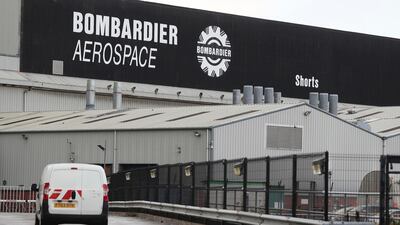The UK’s prime minister criticised Boeing and warned of the perils of creeping protectionism after a complaint by the Chicago plane maker led to punishing duties on its rival Bombardier, threatening thousands of jobs in Northern Ireland.
Theresa May said that Boeing’s complaint to the US trade authorities undermined its lucrative relationship with the UK government and threatened thousands of jobs in Northern Ireland, but stopped short of vowing retaliation against the company.
The government said it was confident of overturning the ruling, but the announcement of duties of almost 220 per cent on some aircraft was a damaging blow to the personal prestige of Theresa May, the prime minister, who had personally lobbied Donald Trump on Bombardier’s behalf.
The prime minister, whose minority government relies on support from a Northern Irish party to stay in power, said on Twitter that she was bitterly disappointed by the decision.
“We have a long-term partnership with Boeing in various aspects of government and this is not the sort of behaviour we expect from a long-term partner and it undermines that partnership," May said in response to a question at a Bank of England event on Thursday.
More than 4,000 jobs are at risk at a manufacturing plant in Belfast making wings for the aircraft affected by the decision.
The setback was seized on by government critics to highlight the difficulties of pro-Brexit Britain, after May’s government had highlighted the importance of striking a new trade deal with the United States after leaving the European Union.
Jeremy Corbyn, the leader of the Labour opposition, said the prime minister should reflect on “how 220 per cent tariffs are going to boost our exports from this country.”
Boeing claimed that the Canadian firm was receiving unfair advantage by using government subsidies to sell planes at artificially low prices.
The UK government retaliated with a warning that future Boeing defence contracts with the UK were at risk over its stance in the Bombardier dispute.
“Boeing has significant defence contracts with us and still expects to win further contracts,” said Defence Secretary Michael Fallon. “Boeing wants and we want a long-term partnership but that has to be two-way.”
Analysts pointed out that the UK’s options to take on Boeing was limited by the company’s own investments in the UK. The company says that the UK is its third largest supplier after the US and Japan and has started building a manufacturing plant in northern England. Boeing said the firm and its suppliers account for nearly 19,000 jobs in the UK.
Unions accused the prime minister of failing to protect workers. “Theresa May has been asleep at the wheel when she could and should have been fighting to protect these workers,” said Ross Murdoch, of the GMB union. “It’s high time she woke up.”
Boeing claimed that Bombardier received at least $3 billion in subsidies from Britain, Canada and the province of Quebec, allowing it to sell planes to US-based Delta Air Lines for less than cost price.
Delta last year agreed to buy 75 of Bombardier’s new CS100 aircraft with an option for 50 more in a deal worth an estimated $5.6 billion.
Delta says that Boeing does not make similar sized planes it needs for short to medium term trips and Business Secretary Greg Clark said the preliminary finding was “unjustified”.
“We’re confident that we will be able to demonstrate that and have this case dismissed,” Mr Clark told Sky News.

